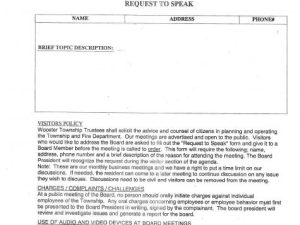PUBLIC MEETING INFORMATION
 VISITORS POLICY
VISITORS POLICY
Wooster Township Trustees shall solicit the advice and counsel of citizens in planning and operating the Township and Fire Department. Our meetings are advertised and open to the public. Visitors who would like to address the Board are asked to fill out the “Request to Speak” form and give it to a Board Member before the meeting is called to order. This form will require the following; name, address, phone number and a brief description of the reason for attending the meeting. The Board President will recognize the request during the visitor section of the agenda.
Note: These are our monthly business meetings and we have a right to put a time limit on our discussions. If needed, the resident can come to a later meeting to continue discussion on any issue they wish to discuss. Discussions need to be civil and visitors can be removed from the meeting.
CHARGES / COMPLAINTS / CHALLENGES
At a public meeting of the Board, no person should orally initiate charges against individual employees of the Township. Any oral charges concerning employees or employee behavior must first be presented to the Board President in writing, signed by the complainant. The board president will review and investigate issues and generate a report for the board.
USE OF AUDIO AND VIDEO DEVICES AT BOARD MEETINGS
Photographic and electronic audio/video devices may be used at regular and special Board meetings legally open to the public as long as the following guidelines are met: 1) devices may be used only when all parties involved have been informed, 2) operations of the devices are not disruptive to those present at the meeting, and 3) the Board has a right to halt any and all recording that interrupts or disturbs the meeting.
EXECUTIVE SESSION
Per the Ohio Township Association, “there are eight established exceptions to the Open Meetings Law (that) allow public officials to go into executive session, that is, a portion of a meeting that is not open to the public – Revised Code 121.22(G). They are; specific employment matters, purchase or sale of real or personal property, pending or imminent court action, negotiations with public employees, confidential matters, securtiy and emergency procedures, hospital trade secrets, and economic development assistance. From time to time, the trustees may request the meeting be moved to executive session to discuss any of the above listed topics.
